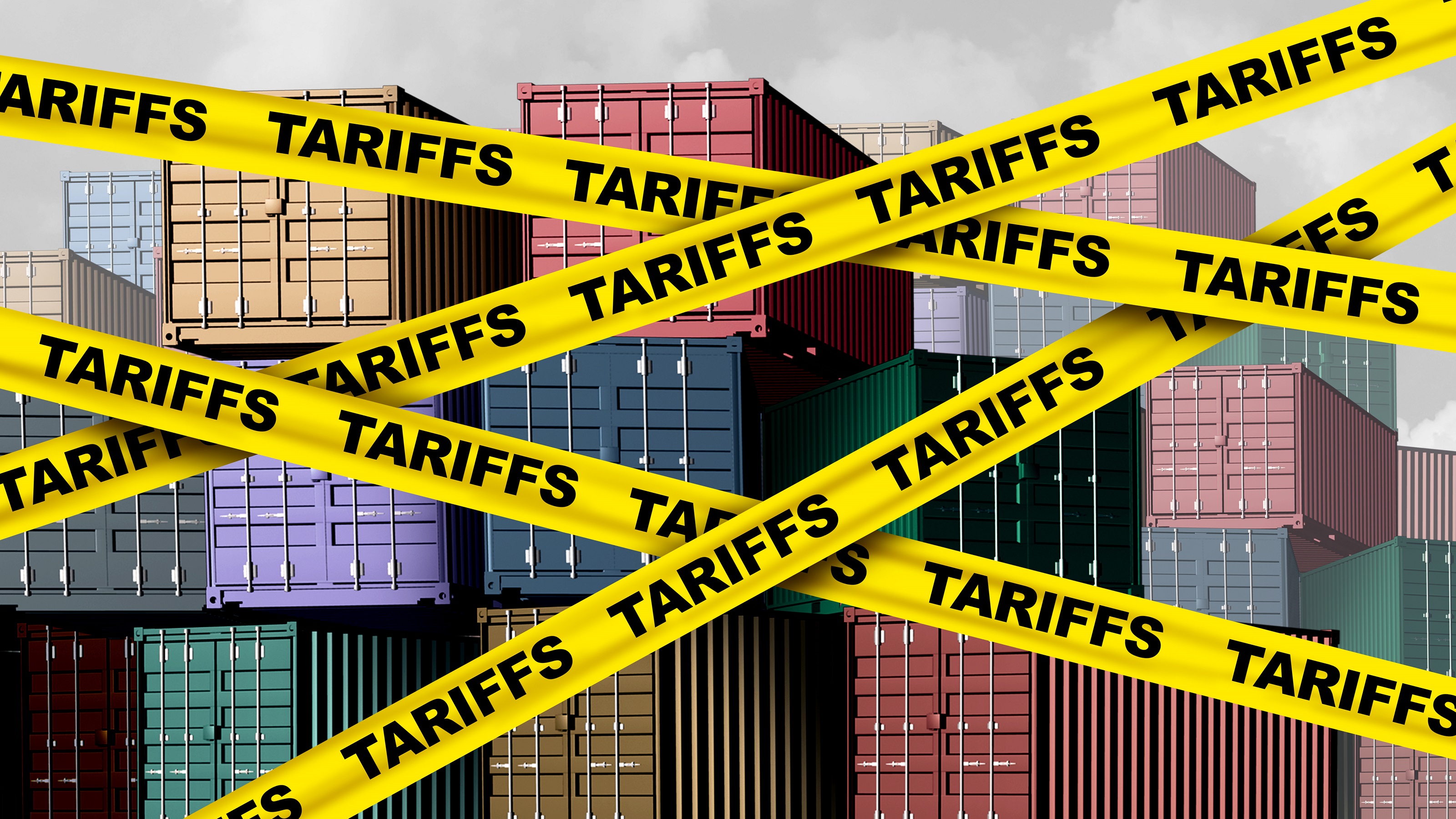Two Don'ts and Four Dos During Trump's Trade War
The financial rules have changed now that tariffs have disrupted the markets and created economic uncertainty. What can you do? (And what shouldn't you do?)


Profit and prosper with the best of Kiplinger's advice on investing, taxes, retirement, personal finance and much more. Delivered daily. Enter your email in the box and click Sign Me Up.
You are now subscribed
Your newsletter sign-up was successful
Want to add more newsletters?

Delivered daily
Kiplinger Today
Profit and prosper with the best of Kiplinger's advice on investing, taxes, retirement, personal finance and much more delivered daily. Smart money moves start here.

Sent five days a week
Kiplinger A Step Ahead
Get practical help to make better financial decisions in your everyday life, from spending to savings on top deals.

Delivered daily
Kiplinger Closing Bell
Get today's biggest financial and investing headlines delivered to your inbox every day the U.S. stock market is open.

Sent twice a week
Kiplinger Adviser Intel
Financial pros across the country share best practices and fresh tactics to preserve and grow your wealth.

Delivered weekly
Kiplinger Tax Tips
Trim your federal and state tax bills with practical tax-planning and tax-cutting strategies.

Sent twice a week
Kiplinger Retirement Tips
Your twice-a-week guide to planning and enjoying a financially secure and richly rewarding retirement

Sent bimonthly.
Kiplinger Adviser Angle
Insights for advisers, wealth managers and other financial professionals.

Sent twice a week
Kiplinger Investing Weekly
Your twice-a-week roundup of promising stocks, funds, companies and industries you should consider, ones you should avoid, and why.

Sent weekly for six weeks
Kiplinger Invest for Retirement
Your step-by-step six-part series on how to invest for retirement, from devising a successful strategy to exactly which investments to choose.
The trade war that began on April 2 was foretold. Even before President Donald Trump was elected, he made it very clear that he wanted to completely realign the global economy to put “America First.”
To do so required breaking old alliances and leaving behind a decades-long global economic order that had allowed for the free flow of goods between countries.
Investors on both sides of the political spectrum were sure he would not follow through with his threats, expecting him to take the same, not-as-aggressive approach that he took during his first administration.
From just $107.88 $24.99 for Kiplinger Personal Finance
Become a smarter, better informed investor. Subscribe from just $107.88 $24.99, plus get up to 4 Special Issues

Sign up for Kiplinger’s Free Newsletters
Profit and prosper with the best of expert advice on investing, taxes, retirement, personal finance and more - straight to your e-mail.
Profit and prosper with the best of expert advice - straight to your e-mail.
But the signs were there that this time would be different — in the criticism of NATO, the treatment of Ukraine and the flouting of court orders and civil liberties. The zeitgeist shifted long before April 2, and we are now living in its aftermath.
So, in a new world with new rules, here are two don’ts to keep in mind and four dos.
1. Do not count on a Fed intervention to save you
The Federal Reserve will likely be constrained as to how much it can drop interest rates, even when growth slows to a trickle.
This is because we may yet to see inflation spikes in the prices of durable goods as the costs of tariffs are passed on to consumers.
It is important to understand that the Fed has two key mandates: to keep unemployment numbers low and to maintain inflation rates at around 2%.
With immigration slowed significantly (legal or otherwise), the labor market may remain steady due in part to a smaller workforce, and the Fed will not have the option to lower rates.
In addition, if tariffs cause the cost of goods to rise, the Fed will need to keep rates steady or possibly even raise them, which could negatively affect the markets.
For bond investing, that means staying relative short on the yield curve (using bond ETFs or funds with a duration of no more than five years) and emphasizing Treasury inflation-protected securities (TIPS) that also do not go beyond a five-year duration might be the safest play.
2. Do not assume the former winners will be the future winners
U.S. companies, particularly those in the tech sector, have been the clear winners these past few years. Even as their valuations were stretched, most (not all) deserved these rich valuations as they were steadily growing cash machines.
The trade war has completely changed this reality.
Make sure your portfolio contains high-quality international investments in developed countries that have stable governments.
Also, look for companies that are in more defensive sectors, such as consumer staples, health care and utilities.
Owing high-quality companies that trade in another currency (think the yen or euro) will also benefit investors if the value of the U.S. dollar declines, as it is currently doing.
And here are the dos:
1. Do consider individual stocks over ETFs or mutual funds
I know this may be my most controversial opinion, but hear me out. Exchange-traded funds (ETFs) have become the darlings of Wall Street — and for good reason. They allow the average investor to buy huge swaths of the market, and whole indexes, with one trade and at extremely low costs.
Further, it is common knowledge that passive indexing outperforms so-called stock picking most of the time.
However, in a period like this one, there is value in really knowing precisely what you own. It may sound old-fashioned, but owning high-quality companies that pay a dividend and provide a service or product you like and understand can be a sound investment strategy, even when things are not so precarious.
And if you are careful to build a portfolio of 25 to 40 stocks that are diversified across sectors (emphasizing the defensive sectors now), you can certainly minimize your risk.
2. Do consider adding alternative asset classes to your portfolio
I’m not advocating that you buy gold. While a precious metal like that can, in small measure, help your portfolio, I’ve never been a fan because it doesn’t pay a dividend and can be more of a “trade” than an investment.
That said, you could look to invest in real assets that may hold their value a bit better in this environment. Diversified real estate, timber and land all have their place in a well-diversified portfolio.
3. Do maintain a higher-than-usual cash reserve
We are in a period of profound uncertainty, not just because of the trade war, but because of the underlying geopolitical realignment that it represents.
I do not anticipate our country will return to a less chaotic time in the foreseeable future. The reputational damage to the United States as the leader of the free world cannot be overstated.
The “trust dividend” that the United States has been the recipient of was easy to ignore. It allowed us as a nation to run higher-than-average deficits and still enjoy reasonable borrowing costs.
The U.S. was where the rest of the world stored its money when times were hard. For those of us who are Baby Boomers, it was simply the water we swam in. Some of us are now noticing the water for the first time and seeing it drain down to dangerous levels.
Because of this, as an investor, you want maximum optionality — and nothing gives you as many options as good old-fashioned cash. The good news for holding cash now is that you can still get a yield that’s greater than the rate of inflation.
4. Do review your long-range financial plan with your financial planner
Despite the chaos, it is important to keep your eyes on the long term as an investor, even if the rules have shifted.
For this reason, make sure to check in with your financial planner and ask them to rerun your numbers. It may give you some peace to know that your longer-term plans are still viable and that what you are either spending or plan to spend is still sustainable.
A good financial planner can run what-if scenarios for you that factor in higher inflation and lower returns and can give you advice about how much risk you must take to keep you financially stable and comfortable throughout your lifetime.
Our clients appreciate that we see the goal of solid retirement planning and long-term investment not as a means to making you rich, but to keep you from getting poor.
So, what do we do when the rules have changed? We stay informed on where we’re invested, diversify across multiple sectors and, most of all, expect more of the unprecedented to come our way.
Related Content
- What’s Happening Now With Trump Tariffs? April Updates to Know
- Trump to Tariffs: How Retirees Can Manage Market Turmoil
- Trump's ‘One Big, Beautiful Bill’ With Trillions in Tax Cuts: House Moves Forward
- Social Security Under Trump: Live Updates to Keep You Up to Date
- What Trump Has Done With Medicare So Far
Profit and prosper with the best of Kiplinger's advice on investing, taxes, retirement, personal finance and much more. Delivered daily. Enter your email in the box and click Sign Me Up.

My main interest is in people — getting to know them, listening to them and helping them balance their finances with the rest of their lives in a way that has meaning to them. I started in the financial industry in 2002 and opened Maggie Kulyk and Associates soon after. In 2018, this business became Chicory Wealth, a fee-only financial life planning and sustainable wealth management firm. I’m a CRPC® (Chartered Retirement Planning CounselorSM), a Chartered SRI Counselor™ and a member of the Financial Planning Association. I’m also the author of Integrating Money and Meaning: Practices for a Heart-Centered Life.
-
 Nasdaq Leads a Rocky Risk-On Rally: Stock Market Today
Nasdaq Leads a Rocky Risk-On Rally: Stock Market TodayAnother worrying bout of late-session weakness couldn't take down the main equity indexes on Wednesday.
-
 Quiz: Do You Know How to Avoid the "Medigap Trap?"
Quiz: Do You Know How to Avoid the "Medigap Trap?"Quiz Test your basic knowledge of the "Medigap Trap" in our quick quiz.
-
 5 Top Tax-Efficient Mutual Funds for Smarter Investing
5 Top Tax-Efficient Mutual Funds for Smarter InvestingMutual funds are many things, but "tax-friendly" usually isn't one of them. These are the exceptions.
-
 Nasdaq Leads a Rocky Risk-On Rally: Stock Market Today
Nasdaq Leads a Rocky Risk-On Rally: Stock Market TodayAnother worrying bout of late-session weakness couldn't take down the main equity indexes on Wednesday.
-
 Quiz: Do You Know How to Avoid the 'Medigap Trap?'
Quiz: Do You Know How to Avoid the 'Medigap Trap?'Quiz Test your basic knowledge of the "Medigap Trap" in our quick quiz.
-
 5 Top Tax-Efficient Mutual Funds for Smarter Investing
5 Top Tax-Efficient Mutual Funds for Smarter InvestingMutual funds are many things, but "tax-friendly" usually isn't one of them. These are the exceptions.
-
 Why Invest In Mutual Funds When ETFs Exist?
Why Invest In Mutual Funds When ETFs Exist?Exchange-traded funds are cheaper, more tax-efficient and more flexible. But don't put mutual funds out to pasture quite yet.
-
 We Retired at 62 With $6.1 Million. My Wife Wants to Make Large Donations, but I Want to Travel and Buy a Lake House.
We Retired at 62 With $6.1 Million. My Wife Wants to Make Large Donations, but I Want to Travel and Buy a Lake House.We are 62 and finally retired after decades of hard work. I see the lakehouse as an investment in our happiness.
-
 Social Security Break-Even Math Is Helpful, But Don't Let It Dictate When You'll File
Social Security Break-Even Math Is Helpful, But Don't Let It Dictate When You'll FileYour Social Security break-even age tells you how long you'd need to live for delaying to pay off, but shouldn't be the sole basis for deciding when to claim.
-
 I'm an Opportunity Zone Pro: This Is How to Deliver Roth-Like Tax-Free Growth (Without Contribution Limits)
I'm an Opportunity Zone Pro: This Is How to Deliver Roth-Like Tax-Free Growth (Without Contribution Limits)Investors who combine Roth IRAs, the gold standard of tax-free savings, with qualified opportunity funds could enjoy decades of tax-free growth.
-
 One of the Most Powerful Wealth-Building Moves a Woman Can Make: A Midcareer Pivot
One of the Most Powerful Wealth-Building Moves a Woman Can Make: A Midcareer PivotIf it feels like you can't sustain what you're doing for the next 20 years, it's time for an honest look at what's draining you and what energizes you.